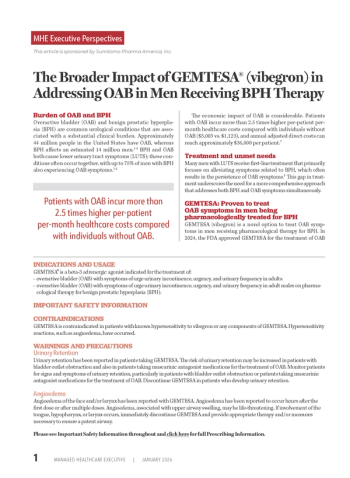
How CenterWell Senior Primary Care has Adapted to the Changing Business Landscape and Evolving Consumer Needs
It is imperative that healthcare systems adapt to the changing health needs of the populations we treat and, since the American population is rapidly aging, that means investing in senior-focused care. According to the U.S. Census Bureau, more than
CenterWell Senior Primary Care puts seniors at the center of everything we do. We have continued to adapt to evolving consumer needs, from the pandemic to social determinants of health, while moving beyond a transactional fee-for-service model in favor of value-based care. CenterWell Senior Primary Care, along with our sister brand Conviva Care Center, has addressed healthcare needs and challenges to support patients and providers in four areas:
- Adapting During the Pandemic: The most salient example of adaptation in healthcare took place in 2020 when the pandemic threatened the health of all Americans, especially seniors who have the highest risk of severe illness. Seniors were told to distance themselves from other people, causing many to be hesitant of in-person doctors’ visits. However, missing regularly scheduled appointments can lead to health complications, especially since
64% of seniors manage two or more chronic conditions, according to the CDC. Understanding the sudden shift in seniors’ needs, CenterWell adapted by offering telehealth appointments and curbside visits.
The loneliness many seniors faced during the pandemic also caused challenges, as research shows that social isolation can have a negative effect on mental health. In fact, one in five (19%) seniors reported worse depression or sadness and 28% reported worse anxiety or worry since the start of the pandemic. In response, the CenterWell team also checked in with patients regularly to monitor their mental and physical health during this strenuous time and connected them with behavioral health specialists when necessary. Ultimately, across all of our centers, CenterWell saw a significant increase in annual wellness visits in 2020, despite the pandemic.
- Avoiding Physician Burnout: Physicians have been facing burnout for many years, and the pandemic only exacerbated that problem. In fact, a recent report published in
Mayo Clinic Proceedings found a dramatic increase in physician burnout and decrease in satisfaction with work-life integration from 2020 to 2021 across the country. Also, astudy from the University of Chicago found that primary care doctors would need nearly 27 hours each day to meet the recommended guidelines of care, which puts a strain on physicians’ mental health and may cause doctors to conduct shorter visits with patients.
To address physician burnout and provide better care for patients, CenterWell Senior Primary Care employs a care team approach, which means doctors are supported not only by nurses and administrators, but also with in-house pharmacists, social workers and behavioral health specialists. This allows doctors to spend less time on administrative duties and more time with each patient – up to 40 minutes per visit.
- Supporting SDOH and Underserved Communities: We also implemented a care team approach to address the lifestyle factors that impact seniors’ health, like access to nutritious food, transportation, isolation, and mental health. In fact, over 30% of older Americans face social determinants that act as barriers to good health. These issues tend to be more prominent in medically underserved communities, as these geographical areas tend to lack healthcare resources.
In response, CenterWell Senior Primary Care has strategically positioned our centers in locations that need them the most, providing quality healthcare for patients with a variety of Medicare Advantage plans. Additionally, by having pharmacists, social workers and behavioral health specialists all under one roof, CenterWell can address healthcare needs as well as the physical, mental and emotional health of our patients. For example, during those longer visits with patients, if a physician learns that a patient faces food insecurity, they can refer the senior to a social worker who can connect them with community resources. Similarly, if a senior is struggling with social isolation, a behavioral health specialist can assist with mental health needs.
- Evolving the Payment Model: The business landscape in America’s healthcare system is constantly evolving. At CenterWell Senior Primary Care, we recognized that the traditional fee-for-service (FFS) payment model was very transactional. That is why we use a value-based payment model, which ties our centers’ payment to patient outcomes. Value-based primary care is uniquely positioned to solve the problems and health challenges seniors face, combining the trust and influence of the primary care physician-patient relationship and a revenue model that rewards investment in proactive, longitudinal care.
CenterWell Senior Primary Care’s unique business model, care team approach and ability to adapt is what contributes to us being the largest senior-focused healthcare network in the country. We have helped seniors across 11 states navigate through the pandemic, address the lifestyle factors affecting their health, manage their chronic conditions and improve their quality of life – all while supporting the health care professionals who keep us true to our mission. We have plans to expand to new markets in 2023 and beyond, increasing access to care for seniors in medically underserved areas across the country.
Newsletter
Get the latest industry news, event updates, and more from Managed healthcare Executive.





















